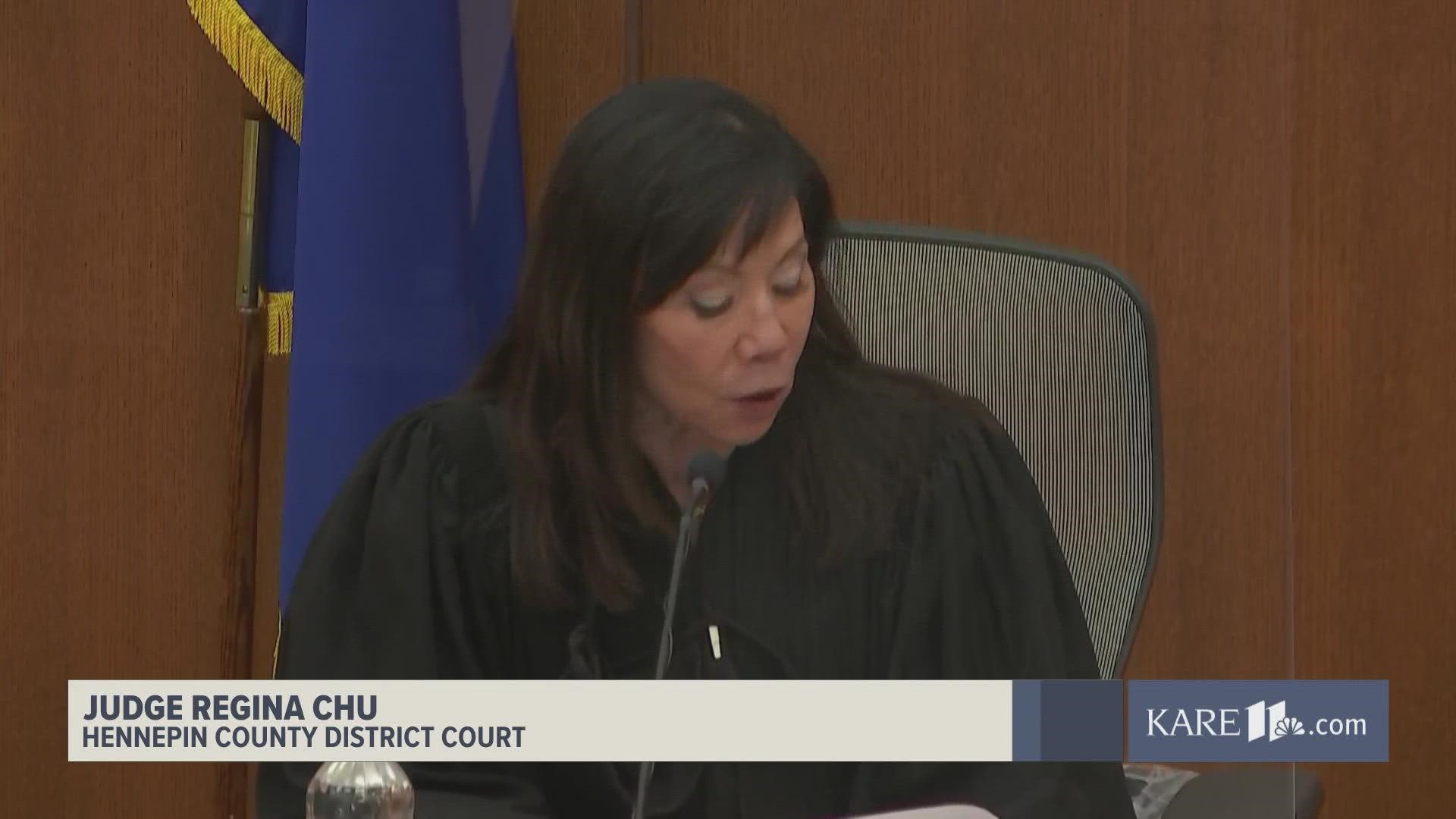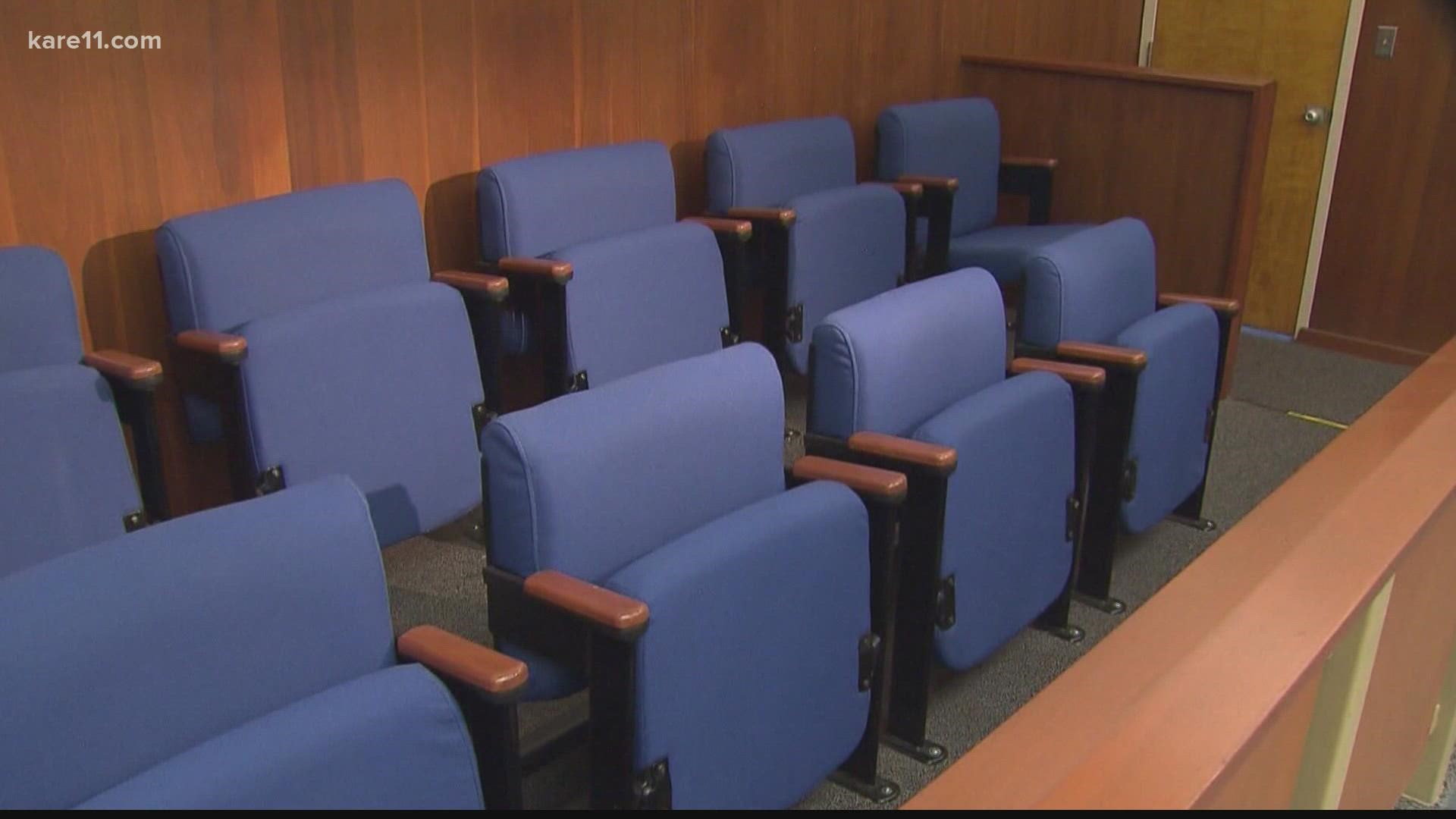MINNEAPOLIS —
- The jury paused deliberations Tuesday afternoon to ask about protocol if it cannot reach a consensus
- Case sent to jury shortly before 1 p.m. Monday
- Earl Gray delivers closing argument for the defense
- Erin Eldridge, Matthew Frank deliver closing argument and rebuttal for the prosecution
6 p.m.
The second day of jury deliberation came to a close without a verdict Tuesday night.
The panelists adjourned just after 6 p.m. and will be sequestered for the second night in a nearby hotel. They are scheduled to resume deliberations Monday at 9 a.m.
4:30 p.m.
The jury returned to the courtroom Tuesday afternoon with more questions for Judge Regina Chu, as the 12-person panel continued its deliberations for the second day.
Chu entered the courtroom followed by the jury at 4:30 p.m., announcing that the panel had two questions. The first asked how long the jurors have to deliberate and what next steps should be taken if the jury cannot reach a consensus. Chu read aloud instructions previously given to the jurors, reminding them to discuss the evidence carefully amongst each other, consider each other's views and not to surrender their honest opinions in order to reach a verdict.
The jury also asked Judge Chu if they would be allowed to remove zip ties from Potter's gun so it could be held outside of the evidence box. Chu approved the request and explained to the jury the process in which it could be done. She went on to reassure the courtroom that the gun was not loaded and had been fully secured.
Judge Chu said the questions had been submitted at 4 p.m.
Potter's defense team objected to Chu's decision to both re-read the jury instructions, and to let them handle the gun. The defense argued it should stay in its case for safety.
Chu overruled both objections.
The jury was sent back into deliberations.
9:00 a.m.
After deliberating for more than five hours Monday, the jury in the trial of former Brooklyn Center police officer Kim Potter is back at work Tuesday morning trying to reach a verdict.
KARE 11's Lou Raguse posted on Twitter that the 12-person jury resumed work at the Hennepin County Courthouse around 9 a.m., after deliberating from about 12:45 to 6 p.m. Monday following closing arguments in the case.
Jurors are expected to remain sequestered during their deliberation, but will be allowed to have limited electronic contact with family.
Potter is on trial for the April 11, 2021 shooting death of Daunte Wright and faces first- and second-degree manslaughter charges.
On Monday, Judge Regina Chu gave the jury panel its instructions for deliberating, before prosecutor Erin Eldridge delivered closing arguments for the state.
In her arguments, Eldridge doubled down on Potter's decades of experience and firearms training, and that she was up to date on the most recent policies for the Brooklyn Center Police Department.
Eldridge walked through video of Wright’s shooting frame by frame, pointing out how close Potter's gun was to Officer Luckey’s face when she pulled the trigger. “Responsible officers know not to blindly draw their weapons and press the trigger,” Eldridge argued, saying they’re “acutely aware of the risks of getting it wrong.”
Defense attorney Earl Gray began his closing argument by responding to an accusation from the state that the defense would try to send the jury down a "rabbit hole of misdirection.”
Gray reminded the jury that their duty is to presume Potter is innocent, and argued that by resisting arrest and trying to flee, Wright created superseding cause.
“That’s what caused this whole incident,” Gray said. “If he would have gone and went with the officers, been handcuffed, go to the squad car, go take a ride downtown, it would have been over.”
During the state's rebuttal, Matthew Frank struck back against the defense’s mention of Potter making a “mistake.” He said whether it was a mistake or not should have no bearing on the jury’s decision because there is no “mistake defense,” and that Judge Chu will not give instruction on finding a person not guilty if they make a mistake.
Frank said the state only needs to prove that Potter was aware of the risk of using a gun, not that there was a gun in her hand. He said despite the defense’s argument that Potter was not conscious that she was holding her gun, the conscious acts Potter took were reaching for her gun holster, drawing her gun and pulling the trigger.
After dismissing the jury, the defense explained several objections it raised during the state's rebuttal, calling for a mistrial. Judge Chu denied the motion.
More from the trial of Kim Potter
Watch more KARE 11 coverage from the trial of Kim Potter on our YouTube playlist:



